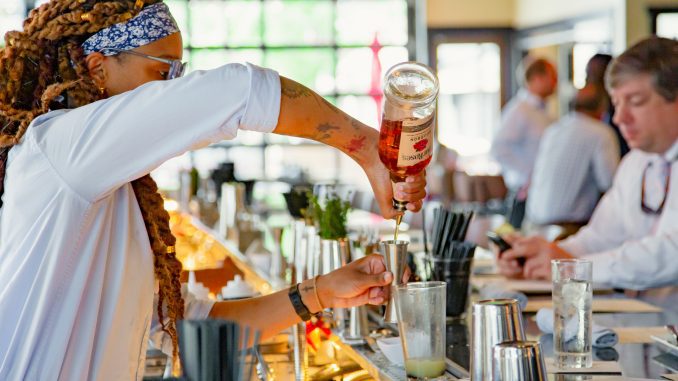
RALEIGH/CHAPEL HILL — While members of Congress wrangle over how to replenish a popular loan program aimed at helping small-businesses retain workers, the sentiment among North Carolina’s restaurant industry is that the aid package does more harm than good.
Congress passed the Paycheck Protection Program (PPP) as part of its CARES Act, also known as the Coronavirus Aid, Relief and Economic Security Act. Any business with less than 500 employees can apply, and the funds are doled out on a first come first serve basis. The first round of funding was exhausted in only a matter of weeks so lawmakers are in the process of negotiating how to replenish the aid as quickly as possible.
The premise behind PPP is that the government will forgive the loans it gives to qualifying businesses as long as the businesses use at least 75 percent of the loan to cover its payroll expenses. In the case of restaurants, this leaves only 25 percent for rent, utilities and mortgage expenses. If an operation does not meet this threshold, the PPP becomes a two-year loan with a 1 percent interest rate. Additionally, businesses must use 100 percent of the loan within 8 weeks of receiving it, or no later than June 30, and therein lies the rub.
Allen Corey is founder and president of SquareOne Holding Company, which owns STIR in North Hills and the Carolina Brewery in Chapel Hill and Pittsboro. He says the CARES Act and more specifically PPP doesn’t address the needs of the restaurant industry’s owners nor its workers and provides barely any assistance.
“We were forced to close our businesses by mandate of the Governor…therefore we laid off all hourly and tipped hourly team members, which was 500-600 people, we only kept our managers. If we are required to use these loan funds in the next 8 weeks it is of no benefit to us because we aren’t open for business, so we essentially become a conduit to receive funds as a loan and pass it along to laid off workers who could actually make more by simply filing for unemployment assistance.”
The problem for bars and restaurants is that they are completely in the dark as to when the government might lift the stay at home orders and allow them to open back up. Without the ability to predict when the economy will normalize, they have no way of knowing if they will be in a better position to pay workers two months from now when their loans dry up, it is actually counterproductive to apply for PPP. Keeping these employees on the payroll could actually prove a disservice to them because it would prevent them from collecting state and local unemployment benefits, which in many cases ends up being more than the PPP loan amount provides.
“We have all been waiting around to see how the CARE Act could possibly help us out, but it’s still just futile language at this point,” says Chris Brett General Manager of STIR. He had to lay off all of his hourly workers which was every single employee with the exception of their five mangers. “We’re trying to remain relevant to the community with the very limited resources we have and to do our part, but it is extremely hard in these uncertain conditions.”
Allen Corey says his combined businesses have lost 90 percent of revenue in the aftermath of the Coronavirus. At STIR in particular, he has retained around 10 percent by filling to-go food and beverage orders. The state of North Carolina bans to-go sales of liquor; however, STIR is doing cocktail kits so people can craft their own beverages at home.
Casey Fox, who owns the Mellow Mushroom pizza restaurants in Raleigh, Durham and Wake Forest, agrees that while the PPP may have been well-intended, it has not helped the very people it was set up to assist.
“The program should have been means tested,” he said. “The problem is the less your business is impacted, the more it helps you, and conversely the more you are impacted the less it helps you.”
Fox’s restaurants are still operating at 50 percent labor and revenue levels, but he has definitely felt the economic toll. He said he is always looking out for what is in his workers best interests that the way the government has structured PPP versus the state and federal unemployment benefits, a lot of workers stand to make more by filing for unemployment.
The state provides $350/week in unemployment benefits and the CARES Act gives workers and additional $600/week for up to 4 months, which means workers stand to receive $950/week by filing for unemployment as opposed to likely making less if forced to stay on their payrolls through the shutdown.
“If you bring them back to work, they are not able to get that $950 and so you almost feel like it’s doing them a disservice,” Fox said. “Like all programs there are people taking advantage of it.”
Fox is referring to the fact that any business with less than 500 employees can get the PPP loans even if they are not laying off workers. Banks for example, which may still be operating at full capacity, can still get the loans without having to adjust staffing levels in two months.
Before the Coronavirus pandemic struck, restaurants were the largest U.S. employer, supporting over 15.6 million jobs with projected sales of $899 billion for the year 2020. The National Restaurant Association also reports 9 in 10 restaurants have less than 50 employees.
Corey says his solution would be to allow business to borrow money under the CARES Act and spend it on payroll when they are able to reopen. “That would protect workers’ paychecks and jobs and provide these companies with some working capital to reopen.”
With a record setting 22 million Americans filing for jobless benefits in just the last month alone, few would argue some sort of federal assistance is needed, but the way the government has set up PPP puts the majority of the restaurant industry in a no-win situation.
“The government required us to close then proceeds with a $2.3 trillion dollar program that seems to be the exact opposite of what was intended,” Corey says. “We get the added bonus of more government and a future of higher taxes without any assistance. So our conclusion is CARES Act is a complete bust.”

